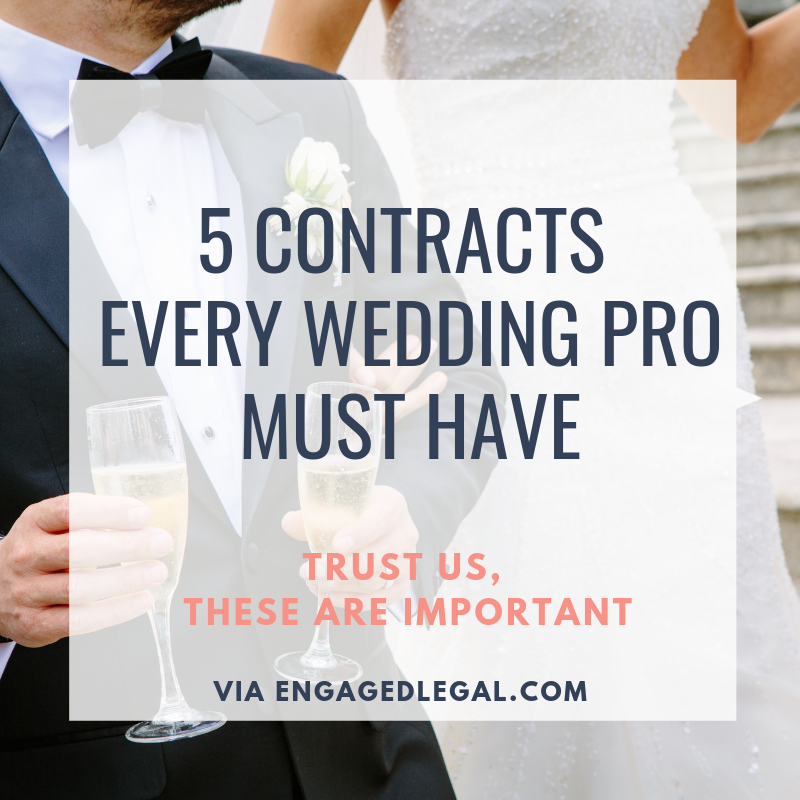Contracts: 4 Things to Know about "Force Majeure"/ "Acts of God"
/UPDATED: Sept. 5, 2019
HAPPY HURRICANE SEASON!
With Dorian bearing down on the East Coast, wedding goers from New York down to Florida are all cautiously watching the impending storm with bated breath. As the North Carolina/ Virginia area braces for impact, my home-turf event industry friends are busy altering plans, stocking up on ponchos, and "keeping calm and carrying on."
But what happens if things get so bad there's no way to "carry on?"
I'm talking about "Acts of God," aka Force Majeure events. You might have noticed it in the boring-AF parts at the end of our contract templates or in any other contract drafted by an attorney. So what is this, and why is it so important?
1. What is force majeure/ Acts of God clause?
A force majeure clause is a (reasonably) unforeseeable occurrence that prevents a party to a contract from doing something they were contractually obligated to do. It's usually some sort of catastrophe outside of the control of the parties that makes performing your end of the deal impossible or extremely dangerous. When a force majeure event occurs, the parties to the contract don't get penalized (monetarily) for not doing what they are supposed to do, unlike what normally happens (a “breach” that results in $$$).
2. Why do I care?
Without a force majeure clause, you could be in breach of contract for not showing up to photograph an event during a tornado!
While that's dramatic sounding, it's legally correct. Which is why we have these types of clauses!
Another reason you might want to include this clause is to remind the client that a little rain isn't going to mean they get to cancel the contract and get off scott-free. You need to make sure they are aware that they are responsible for paying you even if their outdoor event is cancelled. The only reason they get to get out of the contract without paying are for CATASTROPHES, not just an outdoor rain shower!
3. What counts as force majeure/ an Act of God?
A force majeure event isn't just a rainstorm during an outdoor wedding. That's not the catastrophe-level kind of stuff we're looking for. A force majeure event would be a tornado, a fire that destroys the building, major flooding, and-- yes-- a hurricane. It's something you can't "anticipate or control."
Over the years, "civil insurrection," "riots," and "wars" have been considered force majeure events. I wasn't big on writing in "civil insurrection" until last year post-Charlottesville protests, but it's something I've worked back into my vendor contracts just in case.
Another “Act of God” is something like a heart attack. Jury is out if labor/ pregnancy complications count, so I add that into my contracts separately.
4. What doesn't count as force majeure/ an Act of God?
Rain. Thunderstorms. Minor flooding of a field or outdoor venue. Plumbing issues (which happened to a dear friend of mine at her wedding). Illness. GIVING BIRTH (usually). All of those things aren't typically going to fall into the force majeure event interpretation, because they are foreseeable and-- honestly-- not "bad" enough to constitute a catastrophe.
You need to plan and contract for each of these occurrences separately from force majeure. That's why we cover illness, replacements, etc. in our contracts!
TL;DR/ The bottom line here: A force majeure event is an unexpected catastrophe that means you can't do your job at all OR you risk life/ limb by performing under the contract. Make sure it's in your client service agreement, or you might get stuck out there in good ol' Hurricane Dorian taking photos in your scuba gear.



















